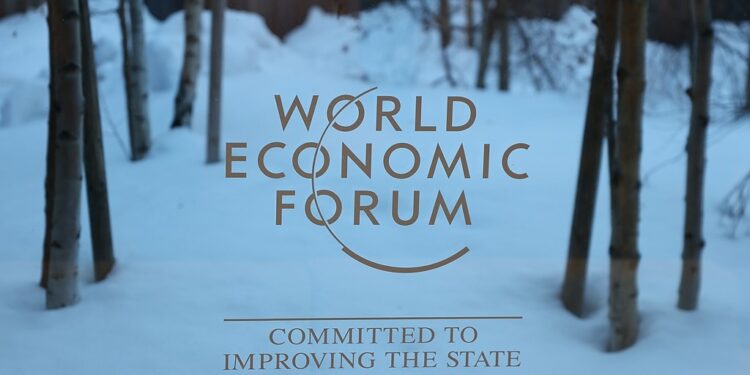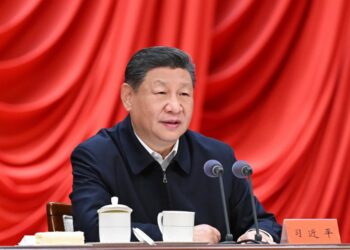(Editor’s note: This article represents the views of the author Karim Badolo and not necessarily those of CGTN.)
The 55th edition of the Davos Forum or World Economic Forum is being held from January 20 to 24, 2025 in Davos, Switzerland. “Collaboration for the intelligent era” is the theme of this annual meeting where nearly 3,000 representatives from around the world and from different fields are expected, including 60 heads of state and government. In a context marked by economic uncertainties, geopolitical tensions and climate challenges, the Davos Forum is banking on reflection and exchanges to address global challenges. For this meeting, discussions on this theme will be structured around five axes.
It is a question of rethinking growth by identifying new sources of prosperity in a changing economic context, of adapting efficient strategies in the face of technological and geopolitical changes, of enhancing human capital to better face economic and technological transitions, of counter climate change by implementing initiatives in favor of the environment and the climate and to restore confidence by opening bridges to cooperation in the face of social and political crises across the planet.
At a time when advanced technologies such as artificial intelligence, quantum computing and biotechnology are creating a new configuration for societies, we must use reflection to better understand the challenges and opportunities that they represent. These technologies undeniably shape the daily lives of societies and bring new situations to which it is imperative to adapt. This is the whole challenge of the Davos Forum 2025. The stakeholders in this meeting, in their respective diversities, intend to propose possible solutions for better benefit from technological innovations. Davos therefore aims to be a platform for exchange, reflection, foresight and influence to positively impact the progress of the world.
What does Africa expect from the Davos Forum? It should be noted that the continent has revisited its format for participation in this economic meeting by abandoning the modalities for obtaining development aid. Africa is now participating in the Forum to offer its potential. In recent years, Africa has been present at Davos to tout the investment opportunities it has. We recall that during the Davos Forum 2024, a white paper, jointly developed by the WEF and the Friends of the African Continental Free Trade Area, identified four priority sectors for Africa. These are agriculture, reducing Africa’s dependence on imports, electric vehicles and pharmaceuticals. As the 55th edition of the Davos Forum opens, these priorities remain relevant. Each area mentioned represents enormous investment potential on the continent. This shows how these four sectors will occupy a prominent place in the discussions during this Davos meeting.
Regarding the agricultural sector, it is worth mentioning that the continent has 60% of the remaining arable land in the world. As a result, it could become the farm of the world and help to effectively combat food insecurity if significant investments are made in the agricultural sector. From the production to the processing of agricultural products, the field is very vast on the continent. Additionally, the White Paper on Africa’s Four Priority Sectors states that intra-African trade in agriculture is expected to increase by 574% by 2030, if tariffs are removed. Input suppliers could contribute enormously to qualitatively transform the agricultural sector in Africa. Agriculture, in its different compartments, therefore represents enormous investment potential in Africa.
As for dependence on imports, the continent is in full urbanization with all that this implies in terms of external demand. The continent must work to produce what it needs for the infrastructure achievements, essential to its socio-economic development. As an illustration, the white paper mentions that the operationalization of the Free Economic Trade Area (AfCFTA) should, by 2030, increase intra-African freight demand by 28%. Anything that will require 2 million trucks, 100,000 rail cars, 250 planes and more than 100 additional ships. Along the same lines, maritime trade is expected to increase from 58 million to 132 million tonnes by the end of the decade. It is imperative to meet these needs locally in Africa, hence the imperative to accelerate the transfer of technologies in order to reduce dependence on imports. Producing on site becomes an absolute priority to considerably reduce dependence on external sources.
Regarding electric vehicles (EV), the white paper announces that by 2035, Africa will be able to produce 4 to 5 million vehicles. This could result in the establishment of more than 20 additional large vehicle manufacturing plants on the continent. The EV market has a bright future on the continent, especially since Africa holds 19% of the minerals and metals essential for the construction of EVs. The promotion of green energy also encourages the use of EV after EV in Africa. Which indicates that this sector has great investment potential on the continent.
Regarding pharmaceutical products, there is talk of improving supply chains as the continent only meets 1% of its needs for medicines. The white paper argues that the ZLECAF, when operational, will create a single African pharmaceutical market to encourage investments. Ultimately, investments could enable Africa to locally manufacture 60% of the vaccines it needs by 2040.
More than a simple act of presence, Africa is going to Davos to propose something concrete and structuring in terms of investments. However, the continent must work more on its economic integration and promote stability through the resolution of conflicts and other security crises. Without a reassuring environment, no investment worthy of the name is possible.
The Davos Forum, since its creation in 1971 by Professor Klaus Schwab, aims to bring together world leaders to discuss global challenges and to propose collective solutions. Economic resilience in the face of geopolitical uncertainty, technological innovation to respond to climate crises and social and economic inequalities will also be on the menu of the different sessions of the 2025 edition.








